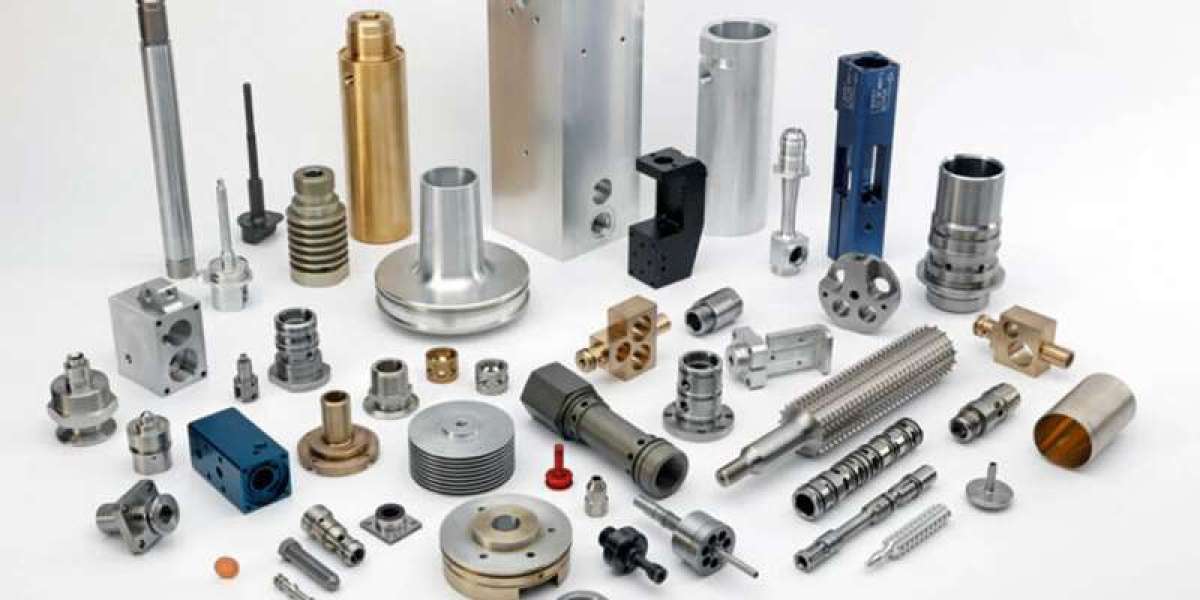In the world of advanced manufacturing, CNC MACHINING stands out as a leading technology that offers unmatched precision, efficiency, and repeatability. From aerospace to automotive, medical devices to consumer electronics, CNC machines play a critical role in fabricating intricate parts and components with extremely tight tolerances. However, the success of any CNC operation is not just about the machinery—it’s also heavily dependent on the type of material used. Choosing the right material can significantly impact the product's performance, longevity, and manufacturing cost. That’s why understanding the CNC Machining Materials List is crucial for engineers, designers, and manufacturers aiming for high-precision outcomes.
This article explores the essential materials used in CNC machining, their unique properties, and their ideal applications. It also provides insights into selecting the best material for your project, all with guidance from the experts at MS Machining.
Why CNC Machining Material Selection Matters
Every material reacts differently to machining operations. Factors like hardness, ductility, corrosion resistance, thermal stability, and electrical conductivity can all influence the final product's performance. The wrong choice of material could result in increased tool wear, low-quality finishes, or even complete part failure. That's why having a comprehensive CNC Machining Materials List is invaluable—it allows manufacturers to match material properties to the demands of the specific application.
Most Common CNC Machining Materials
1. Aluminum
Aluminum is one of the most popular materials in CNC machining due to its excellent machinability, light weight, and corrosion resistance. It’s widely used in aerospace, automotive, and consumer electronics industries.
Key Benefits:
- Excellent strength-to-weight ratio
- Good thermal and electrical conductivity
- Corrosion-resistant
- Cost-effective and recyclable
Common Grades:
- 6061: General-purpose alloy with good strength and corrosion resistance
- 7075: High-strength alloy used in aerospace
- 2024: Strong but less corrosion-resistant
2. Stainless Steel
Stainless steel is another top-tier material used in CNC machining. It is known for its strength, durability, and resistance to heat and corrosion.
Key Benefits:
- High mechanical strength
- Excellent corrosion resistance
- High temperature tolerance
Common Grades:
- 304: General-purpose stainless steel
- 316: Marine-grade, highly corrosion-resistant
- 410: Heat-treatable and used in high-wear environments
3. Carbon Steel
Carbon steels are robust and cost-effective. They offer high strength and hardness, making them suitable for industrial applications, tooling, and automotive components.
Key Benefits:
- High tensile strength
- Good wear resistance
- Readily available and affordable
Common Grades:
- 1018: Good for machining and welding
- 1045: Medium carbon steel used for gears and axles
- 4140: Alloy steel with higher strength and fatigue resistance
4. Titanium
Titanium is a premium material used for its high strength, corrosion resistance, and biocompatibility. It is especially valuable in aerospace, medical, and marine industries.
Key Benefits:
- Extremely strong yet lightweight
- Corrosion and chemical-resistant
- Ideal for implants and aerospace components
Challenges:
- Expensive
- Harder to machine due to toughness
5. Brass
Brass is favored for its ease of machining and aesthetic finish. It is commonly used in plumbing, musical instruments, and decorative hardware.
Key Benefits:
- Highly machinable
- Corrosion-resistant
- Appealing gold-like appearance
Common Grades:
- C360 (Free-machining brass)
6. Copper
Copper is highly conductive and is often used in electrical components and thermal management systems.
Key Benefits:
- Excellent electrical and thermal conductivity
- Antimicrobial properties
- Resistant to corrosion
Challenges:
Softness can lead to deformation
- Costly compared to other materials
7. Plastics (Engineering Thermoplastics)
Plastic materials are lightweight and versatile. They are used when electrical insulation, chemical resistance, or weight reduction is needed.
Popular Options:
- Delrin (POM): High strength, rigidity, and low friction
- Nylon: Tough and wear-resistant
- PTFE (Teflon): Excellent chemical resistance and low friction
- Polycarbonate: Impact-resistant and transparent
- PEEK: High-performance thermoplastic used in aerospace and medical applications
Specialty Materials in CNC Machining
In high-precision and specialty applications, materials such as Inconel, Magnesium, and Tool Steels (D2, A2) are also used. These materials are selected based on specific requirements like extreme temperature resistance, exceptional wear resistance, or magnetic properties.
Factors to Consider When Choosing a CNC Machining Material
When selecting from the CNC Machining Materials List, it’s essential to consider several factors:
- Mechanical Properties – Tensile strength, hardness, and flexibility
- Machinability – Ease of cutting, milling, or drilling
- Thermal and Electrical Conductivity – Important for heat dissipation or electrical components
- Corrosion and Chemical Resistance – Critical for marine or chemical environments
- Cost and Availability – Must meet budget and lead time requirements
- Surface Finish and Tolerances – Precision needs vary by application
CNC Machining Material Tips from MS Machining
At MS Machining, experts help clients identify the right material that meets performance, budget, and project-specific goals. Their material selection process is rooted in years of experience with diverse industries—from prototyping to production-scale manufacturing.
Explore their comprehensive CNC machining materials database at:
https://ms-machining.com/cnc-machining-materials-list/
Whether you're building components for a satellite or a surgical tool, MS Machining ensures your materials meet exacting standards for durability, precision, and quality.
Conclusion
Choosing the right material is a foundational step in any CNC MACHINING project. With a deep understanding of each material’s properties and how they respond to various machining processes, you can improve performance, reduce costs, and ensure the success of your manufacturing goals. The CNC Machining Materials List serves as a valuable reference for engineers and machinists alike, helping them navigate the complex decisions involved in precision production.
With experienced partners like MS Machining, you don’t have to make those choices alone. Leverage their expertise and advanced CNC technology to bring your high-precision projects to life with confidence and consistency.














